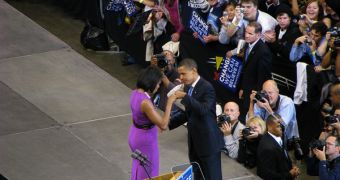Most of the Chinese translations of Obama's inaugural acceptance speech were censored by the Communist Party of China, and information deemed sensitive, such as attacks on communisms and the freedom of speech, was completely removed from all broadcasts. China's move came as a surprise to no one, especially considering that the country censors its media outlets and newspapers as a matter of routine. Still, the speech must have hit some sensible ears in Beijing, seeing how the country's response was so swift.
Obama also addressed the issue of silencing dissent, which the communist rule of China does on a regular basis, especially when it comes to keeping its population away from information regarding the resistance in Tibet and Taiwan. The nation itself is protected by the “Great Firewall,” a censorship system that blocks the nearly 300 million Internet users the country has from accessing sites deemed as “harmful” by the government.
“Recall that earlier generations faced down fascism and communism not just with missiles and tanks, but with sturdy alliances and enduring convictions,” Obama's inaugural address said, but, in Beijing's version posted on the website of Xinhua, the official Chinese news agency, the word “communism” was removed altogether.
“To those who cling to power through corruption and deceit and the silencing of dissent, know that you are on the wrong side of history,” the English version of the speech posted on the same website went on, but, once again, the entire sentence was removed from the official translation.
During the live transmission of Obama's speech on Chinese central TV, when the president came to talk about the facing down of communism, the voice of the translator was cut, and the camera moved back to the studio, where the anchorwoman, looking a bit surprised herself, had to resume the show, by asking a guest a made-up question.
Such actions are not at all uncommon in China, where authorities go to great lengths to ensure that “inappropriate” information does not reach the general public. This denotes an air of concern in Beijing, which seems to fear that the new American administration won't be as indulgent with China as George W. Bush was.

 14 DAY TRIAL //
14 DAY TRIAL //